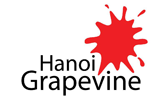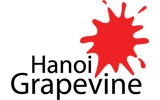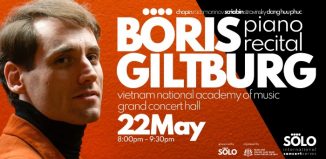KVT – Homage To Honna
(Vietnamese version available)
Last night the Vietnam Symphony Orchestra played at Carnegie Hall. Tonight they play in Boston. This is a tribute to the conductor who brought the VNSO to the stage where they can confidently tour internationally and play in famous orchestral venues.
Mr. Tetsuji Honna
one of my favorite personalities in Hanoi, principal conductor and musical director of the Vietnam National Symphony Orchestra.
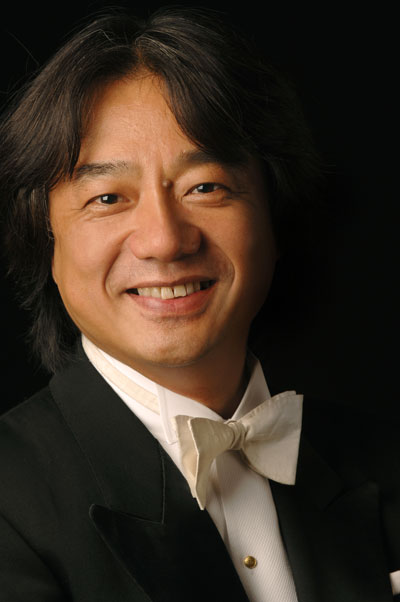
We begin, very appropriately, in October 2000. As we will see, October seems to be a propitious month for him.
Mr. Honna arrived at Noi Bay airport with the Nagoya Philharmonic Orchestra from Japan. They were on a tour of 8 Asian countries with their ‘Flame of Toyota Classics’, with Honna as Permanent Guest Conductor. Little did Honna realize the profound effect this visit would have on his future.
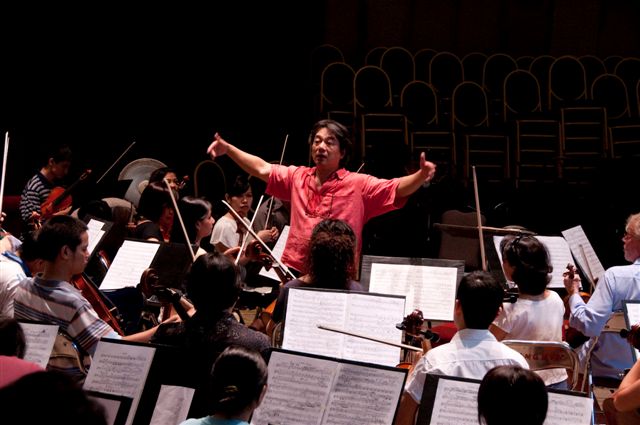 The evening trip into the city, hazily lit by orange-hued lights, was evocative of Japan and as he saw the city by daylight he was overwhelmed in the best way possible. The Hanoi Opera House with its 1911 date in gilded letters over the proscenium seemed a propitious omen and when the orchestra played Saint-Saen’s Cello Concerto No 2 with Vietnamese soloist Ngo Hoang Quan, a special sort of Hanoian magic enveloped him. So when it was suggested that he may like to return to assist in the development of the Vietnam National Symphony Orchestra, he was more than tempted.
The evening trip into the city, hazily lit by orange-hued lights, was evocative of Japan and as he saw the city by daylight he was overwhelmed in the best way possible. The Hanoi Opera House with its 1911 date in gilded letters over the proscenium seemed a propitious omen and when the orchestra played Saint-Saen’s Cello Concerto No 2 with Vietnamese soloist Ngo Hoang Quan, a special sort of Hanoian magic enveloped him. So when it was suggested that he may like to return to assist in the development of the Vietnam National Symphony Orchestra, he was more than tempted.
With Hotel Nikko as a major sponsor, Honna returned to work with the VNSO, conducting Beethoven’s 5th the following February – which is when I first saw him in charge of the orchestra and realized that my ears were onto something very good – and Dvorak’s ‘New World Symphony’, in August.
I asked Honna to recall a magic moment with the VNSO. After consideration, he said it was in 2003 when orchestra member flutist Nguyen Dieu Hong solo-ed in Hisatada Otaka’s Flute Concerto. The second movement sounded overwhelmingly Vietnamese in its evocation of mood and melody.
Mr. Honna grew up in Fukishima, surrounded by music and his father’s extensive LP record collection. As a 12-year-old middle school student he took up the trombone in the school orchestra and stayed with the instrument into his university years. Because the trombone has a lot of non-playing periods during rehearsal and performances, Honna found himself watching the way conductors led the musicians. He used to attend jazz and avant garde music festivals where he met and was mentored by famous Japanese contemporary composer Joji Yuasa and began to be asked to conduct some works.
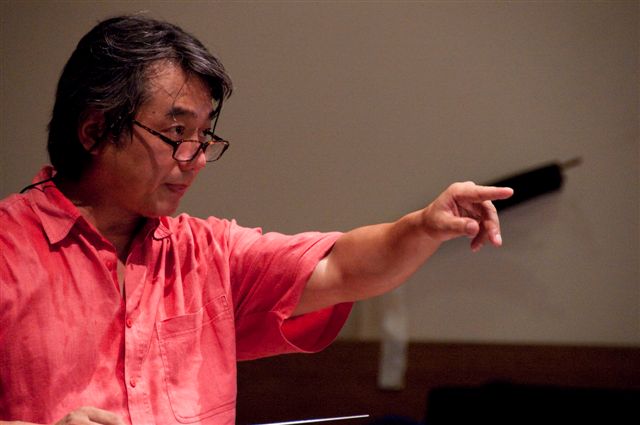
He commenced studies to become a conductor when he was 22 and entered competitions with the Sendai Philharmonic Orchestra. In 1985 he won first prize in the Tokyo International Competition for conductors.
In 1987, in his late 20’s, he was awarded a scholarship to Amsterdam to study. For the next three years, which he describes as the highlight of his life, he spent his time observing and speaking to world famous conductors, and honing his skills. During Holland-Japan Week in Amsterdam in 1991 he conducted an ensemble in works by composers from both countries.
From 1991 to 2001 he was represented by an agent in Budapest and, mainly based in Vienna, made his debuts in the conducting world with the Zagreb Philharmonic and the Arturo Toscanini Symphony Orchestra in Parma, Italy, followed by a list of engagements that read like a grand tour of Europe and was starred with orchestras like the Salzburg Mozarteum Orchestra and the Netherlands Philharmonic.
Japan was not left out of Honna’s musical universe and from 1993 to 1997 he led the Japan Chamber Orchestra (which is famous for its repertoire of 20th century music) as Principal Conductor and from 1995 to 2001 he was permanent conductor of the Osaka Symphony Orchestra.
And back to when this story starts! From 1998-2001, he was with the Nagoya Philharmonic and on that fateful trip to Hanoi.
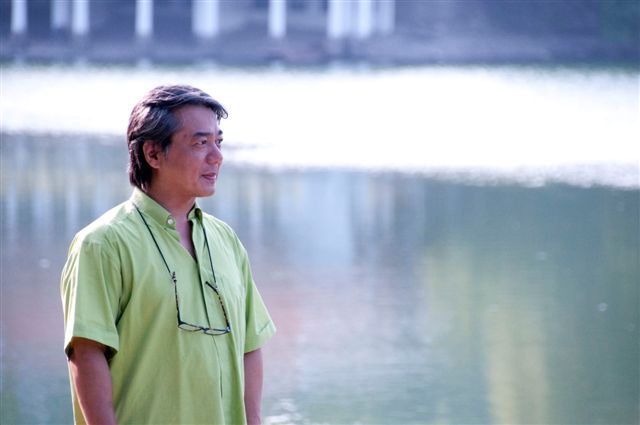
Apart from his performances with the VNSO, Honna’s conducting schedule frequently takes him to Japan where he is music Director of the Orchestra Nipponica, which was founded in 2003 to play and record Japanese music. Honna’s passion here is to find copies of music lost to the public in the dark years after 1944 and restore them to their place in the musical lexicon.
Luckily for Hanoian classical music, Honna has many contacts in Japan and over the years famous, influential, and newly-emerging Japanese instrumental players and singers have solo-ed with the VNSO; sometimes various sections of the orchestra have been swollen by counterparts from Japanese orchestras. Because Honna has a world renowned reputation, we often have excellent international conductors taking over on the podium. German Jonas Alber and American Dorian Wilson are guests this year.
When first appointed to the VNSO, Honna’s and the Orchestra’s dedicated goal was to make it a leading orchestra … with a capacity to tour major overseas venues by 2010. This year … Honna conducted the Orchestra in Carnegie Hall, New York …
Importantly, Japanese orchestras are encouraged to visit Vietnam during their Asian tours. Since 2001, five renowned Japanese orchestras have performed at the Hanoi Opera House. The most recent were the Orchestra Nipponica (2007) conducted by Honna, the Orchestra Libera Classica (2009) led by Hedimi Suzuki who also solo-ed on the cello, and last year the Tokyo Metropolitan Symphony Orchestra, conducted by Honna in a shimmering evening with Brahms.
I asked Honna to recall a magic moment with the VNSO. After consideration, he said it was in 2003 when orchestra member flutist Nguyen Dieu Hong solo-ed in Hisatada Otaka’s Flute Concerto. The second movement sounded overwhelmingly Vietnamese in its evocation of mood and melody.
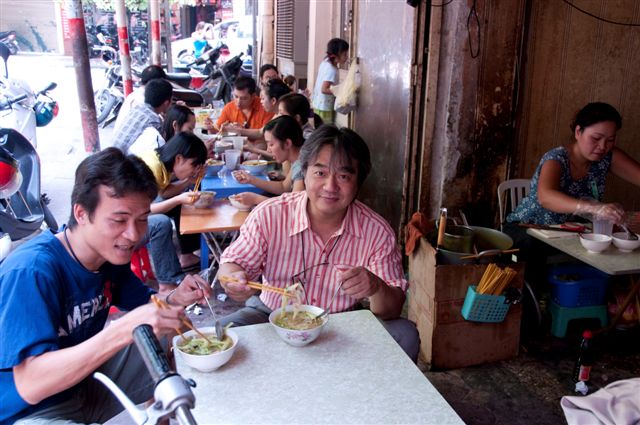
Honna has worked with some of the world’s great musicians and he fondly recalls when he conducted the Argerich Festival Orchestra with the magnificent grand dame of the piano, Martha Argerich, when she performed Concerto for 2 Pianos by W.A.Mozart with Ito Kyoko. She was inadvertently delayed for over 10 hours and Honna had to dismiss the players. Upon arrival Argerich warmly asked Honna to conduct her in an immediate rehearsal, without orchestra. It was another of those memorable magic moments.
With the VNSO his repertoire is predominantly music pre-1900, but Honna also has a great love for contemporary music and contemporary composers and cites, amongst others, Japanese composers Toru Takemitsu, Yasushi Akutagawa, and Akira Ifukube as being important for him.
In the western canon his eclectic preferences put Mozart, J.S.Bach, Mahler and Stravinsky at the top of his list and the Mozart cycle by the VNSO and its chamber orchestra offshoot has been a delight. I have reveled in the challenging Mahler cycle that is ongoing.
Nikolaus Harnoncourt of Austria takes the honor of being Honna’s all time favorite conductor.
When first appointed to the VNSO, Honna’s and the Orchestra’s dedicated goal was to make it a leading orchestra in the ASEAN region by 2005 with a capacity to tour major overseas venues by 2010. Under various conductors the Orchestra has given several concerts in neighboring countries and Honna took them to Tokyo and Osaka in 2004 as participants in the Asia Orchestra Week. In 2008 they were back in Tokyo on a five-concert tour that attracted total audiences of around 12,000 people.
Honna’s ambition is to attempt to keep the heart and color of Vietnam in the VNSO’s music performances
This year, on October 23, Honna conducted the Orchestra in Carnegie Hall, New York and a day later in the Boston Symphony Hall.
The program begins appropriately with American composer Samuel Barber’s ‘Adagio for Strings’. This is considered to be one of the 20th century’s most popular works and is emotively connected with 9/11 Memorial Concerts in New York, and more recently as a memorial piece for earthquake victims in Japan. As the string section of the VNSO is really strong, their performance should be evocative and memorable.
Honna’s ambition is to attempt to keep the heart and color of Vietnam in the VNSO’s music performances, to give them a unique, international sound. The main part of the program is Dvorak’s 8th Symphony. In this, Honna says, the triumphant fullness of the fourth movement combined with the meekness, the softness and the warmth of the other three, allows a mellow Vietnamese feeling to flow through.
Preceding the 8th, sensitive Hanoian violinist Le Hoai Nam will solo ‘Thang Long’, a beautiful violin concerto by legendary Vietnamese composer Dam Linh, which should help cement the VNSO’s international reputation.
I was keen to hear how much rehearsal time conductors are given to rehearse and imprint their particular interpretations onto their musicians. Honna replies that with a very busy international orchestra he may have to accomplish this in two days before actual performance. He prefers at least four days and really appreciates the four to six days he has to prepare the VNSO.
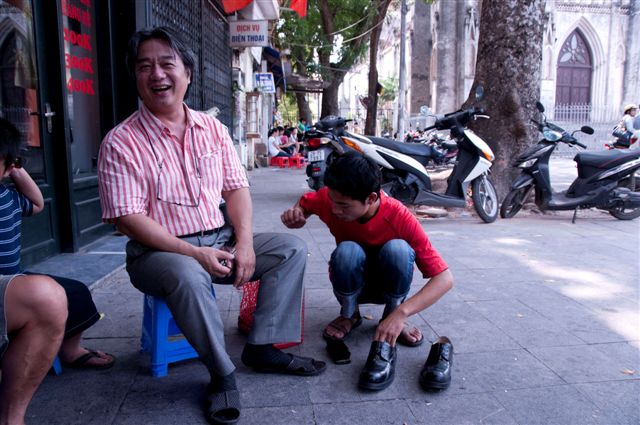
Unlike musicians in professional orchestras in first world countries, VNSO players face the problem of low salaries. This forces them to divide their valuable time between rehearsing for the exceptionally busy VNSO schedule (up to 60 performances a year) and making money in other ways, usually music related – but time consuming. These diverging interests can make rehearsals a trifle fraught and it’s due to Honna’s ongoing belief in the players that they have been able to rise as high as they have in the musical firmament.
As Honna states, the VNSO can only thrive as a proud and professional entity if it gets financial support in addition to that generously provided by the Vietnamese government. At present, ongoing sponsorship is provided by some private companies including Vietnam Airlines, major hotels, Japanese institutions and other philanthropic agencies.
If they’ve come this far in ten years just imagine the musical heights the VNSO could scale if the members could devote themselves full-time to their profession!
As you can see, I’m a big fan of Tetsuji Honna and also of his orchestral family at the VNSO. The next venture on my personal Honna odyssey is to hear him conduct very contemporary music in Japan, or elsewhere in the world. Recognizing his ability in co-coordinating and conducting large choral works, I’d have been over the moon had I been able to see his version of Maderna’s ‘Satyricon’ or his highly acclaimed ‘Orpheus in Hiroshima’ by Yasushi Akutagawa.
I wrote this as a tribute to Maestro Honna, to thank him for giving me, via the VNSO, some of my most memorable Vietnamese moments.
Video clips of Honna conducting in Hanoi and Japan:
Honna conducting Mahler’s 8th , Veni Creator Spiritus (first part) during Hanoi’s 1000 th birthday celebrations, November, 2010
Honna conducts music by Akira Ifukube
http://www.youtube.com/watch?v=XoBb2tKnr0IVideo Clips of Some Music Referred to in Text:
Saint Saens Cello Concerto -First Movement
Beethoven’s Fifth –First movement
Dvorak’s New World Symphony -4th Movement
Hisatada Otaka’s Flute Concerto
http://www.youtube.com/watch?v=uQURnpSF8ug&feature=relatedMozart’s Concerto for Two Pianos-3rd Movement
Barber’s Adagio for Strings
Dvorak’s Eighth- 4th
http://www.youtube.com/watch?v=Rkid0XCzfas | Kiem Van Tim is a keen observer of life in general and the Hanoi cultural scene in particular and offers some of these observations to the Grapevine. KVT insists that these observations and opinion pieces are not critical reviews. Please see our Comment Guidelines / Moderation Policy and add your thoughts in the comment field below. |
